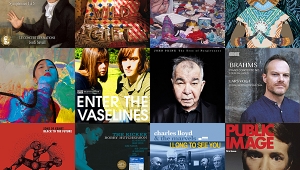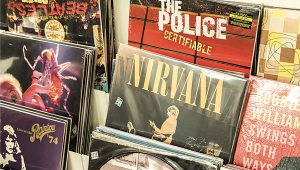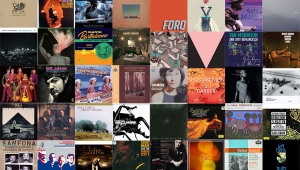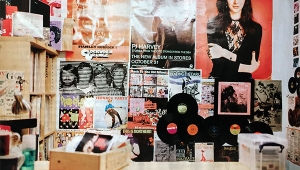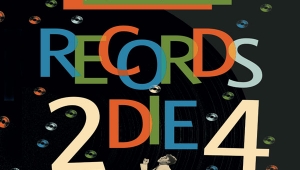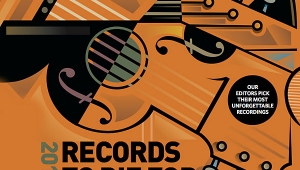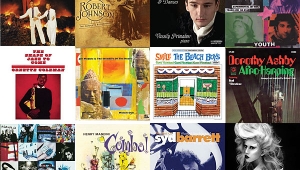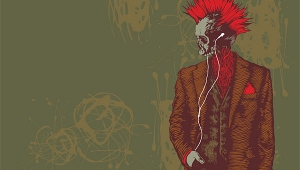| Columns Retired Columns & Blogs |
1996 Records To Die For Page 5
Markus Sauer
HENRI TEXIER "AZUR" QUARTET: An Indian's Week
Henri Texier, bass, percussion; Glenn Ferris, trombone; Tony Rabeson, drums; Bojan Zulfikarpasic, piano, Fender-Rhodes; Michel Portal, bandoneon; Louis Sclavis, clarinet, soprano sax
Harmonia Mundi/Label Bleu LBLC 6558HM83 (CD). Michel Orier, prod.; Bruno Menny, eng. DDD. TT: 74:37
One of the joys of living in Europe is the number of cultures open for inspection and enjoyment. In the US, it's relatively rare to find reviews of albums from non-English-speaking countries. You don't know what you're missing.
PORTISHEAD: Dummy
Geoff Barrow, Fender Rhodes; Clive Deamer, drums; Beth Gibbons, vocals; Adrian Utley, bass; Neil Solman, organ; Richard Newell, drum programming; Dave McDonald, nose flute; Andy Hague, trumpet
Go! Discs 828 522-1 (LP). Portishead, A. Utley, prods. AAA.
RL makes us list the artists and the instruments; the credits of this album even include the samples woven into Portishead's soundscapes. Time to append the reviewer instructions?
Michael Ross
ROSEANNE CASH: : King's Record Shop Concert
Columbia FC/CK 40777 (LP/CD). Rodney Crowell, prod.; Steve Marcantonio, Mark Linett, engs. TT: 38:48
In 1987 Roseanne Cash shared a marriage, some children, and a record label with her then husband Rodney Crowell. More important, they shared a great band and a great engineer. On KRS the band got to cut loose on marvelous material by the likes of John Hiatt, father Johnny, hubby Rodney, and Roseanne herself. As producer, Crowell was in peak form---cosseting, never crowding the tunes. Except for a minor nod to the crashing '80s drum sound (much less offensive on the LP, which sounds better overall), KRS a is a must for lovers of great songs expressively sung and exquisitely played.
RODNEY CROWELL: Diamonds & Dirt
Columbia FC/CK 44076 (LP/CD). Tony Brown, Rodney Crowell, prods.; Steve Marcantonio, eng. TT: 34:34
Rodney took the lessons learned working on Roseanne's King's Record Shop, and the fol! lowing year fashioned a record that knocked Nashville on its butt. The same musicians (wonder who got custody) blasted Crowell's country shuffles---"Crazy Baby," "I Couldn't Leave You If I Tried," "She's Crazy For Leavin' "---to the top of the charts with a sound that combined the spirit of classic honky-tonk music and the best sound that modern technology can offer. (Same sound caveats as above apply.)
Richard J. Rosen
BEACH BOYS: : Pet Sounds
Capitol T 2458 (LP). Brian Wilson, prod.; Chuck Britz, eng. AAA. TT: 35:37
DCC Compact Classics LPZ-2006 (LP), GZS-1035 (gold CD). Steve Hoffman, mastering. AAA. TT: 35:37 CCD
If ever a record could set the example for Full 180-Degree Sound and Living Mono, this is it. The "soundstage" won't extend beyond the speakers, but what's in between is rich and deep, exquisitely realized. Besides, DCC Compact Classics has just released a bona fide audiophile version, so I feel vindicated.!
CHARLES MINGUS: Mingus Mingus Mingus Mingus Mingus
Eddie Preston, Richard Williams, Rolf Ericson, trumpets; Britt Woodman, Quentin Jackson, trombone; Don Butterfield, tuba; Jerome Richardson, soprano & baritone sax, flute; Dick Hafer, tenor sax, clarinet, flute; Booker Ervin, tenor sax; Eric Dolphy, alto sax, flute; Jackie Byard, piano; Jay Berliner, guitar; Charles Mingus, bass, piano; Walter Perkins, Dannie Richmond, drums
Impulse AS-54 (LP), A-54 (CD). Bob Thiele, prod.; Bob Simpson, eng. AAA/AAD. TT: 39:59
GRP/Impulse IMP-170 (LP). Michael Cuscuna, reissue prod. AAA. TT: 39:59
As jazz records go, it would be difficult to limit myself to 40 in the M's alone. Mingus covers every base (as it were). In places this record's beautiful, in others it swings hard. There's inspired solo work---by Charles himself, Booker Ervin, and Eric Dolphy (who never fails to knock me out)---and superb ensemble playing throughout, at the same time tightly controlled and improvisational. As with all Mingus's work, this is rooted in tradition while still sounding cutting-edge, accessible yet challenging enough never to be relegated to the "dinner music" pile as tastes become more sophisticated.
GIL EVANS: Out of the Cool
Gil Evans, piano; Jimmy Knepper, Keg Johnson, trombone; Tony Studd, bass trombone; Bill Barber, tuba; Charlie Persip, Elvin Jones, percussion; John Coles, Phil Sunkel, trumpet; Ray Beckenstein, Eddie Caine, alto sax, flute, piccolo; Budd Johnson, tenor & sporano sax; Bob Tricarico, bassoon, flute, piccolo; Ray Crawford, guitar; Ron Carter, bass
Impulse AS-4 (LP), A-4 (CD). Creed Taylor, prod. AAA/AAD. TT: 37:29
Superb-sounding large-scale jazz by the master arranger who worked closely with Miles Davis on many of his best albums. This one I always recommend alongside Oliver Nelson's The Blues and the Abstract Truth as prime examples of the arranger's art in modern jazz. Hope GRP reissues it soon.
GRAM PARSONS: Grievous Angel
Warner/Reprise MS 2171 (LP). Gram Parsons, prod.; Hugh Davies, eng. AAA. TT:36:14
GRAM PARSONS: GP/Grievous Angel
Warner/Reprise 26018-2 (CD). Gram Parsons, Rick Grech, prods.; Hugh Davies, Ed Barton, engs. AAD. TT: 75:11
With the Byrds and the Flying Burrito Bros., Gram Parsons invented country rock; Grievous Angel was the second of his two solo records, made not long before his death at age 26. (If you buy the CD, it won't sound as good, but his first album is included.) How could a suburban rich-kid make country music so soulful? Something that makes these sound so good today was decidedly un-hip in 1973---Parsons hired Elvis's band, consummate musicians all, including session-man/guitar hero James Burton. The title song is positively epic, and one of the greatest album openers of all time. And both records feature exquisite duets with Emmylou Harris.
NEIL YOUNG: Tonight's the Night
Reprise MS 2221 (LP). David Briggs, Neil Young, prods. AAA. TT: 44:52
An extremely low-tech, simple recording made in a rehearsal space and live at the Fillmore East. One of the great rock records, and a document of a time and a way of life in which drug abuse played a major role. A sample lyric: "I'm singing this borrowed tune I took from the Rolling Stones, / alone in this empty room, too wasted to write my own," sung to the tune of "Lady Jane." Haunting. Beautiful.
HENRI TEXIER "AZUR" QUARTET: An Indian's Week
Henri Texier, bass, percussion; Glenn Ferris, trombone; Tony Rabeson, drums; Bojan Zulfikarpasic, piano, Fender-Rhodes; Michel Portal, bandoneon; Louis Sclavis, clarinet, soprano sax
Harmonia Mundi/Label Bleu LBLC 6558HM83 (CD). Michel Orier, prod.; Bruno Menny, eng. DDD. TT: 74:37
One of the joys of living in Europe is the number of cultures open for inspection and enjoyment. In the US, it's relatively rare to find reviews of albums from non-English-speaking countries. You don't know what you're missing.
This multinational but French-dominated outfit, led by bassist Henri Texier (usually a sideman of Louis Sclavis, today's most important clarinetist), makes wonderful music. Rhythmically and melodically inventive, the album's mood is relaxed, joyful, and at times contemplative. Tight ensemble playing lays a secure background for loose soloing, with Henri Texier's bass prominently featured both as a rhythm instrument and as a melodic lead---which makes for some joyful suprises. The sound is excellent digital, superbly transparent in the bass, with just a touch of congestion on peaks.
PORTISHEAD: Dummy
Geoff Barrow, Fender Rhodes; Clive Deamer, drums; Beth Gibbons, vocals; Adrian Utley, bass; Neil Solman, organ; Richard Newell, drum programming; Dave McDonald, nose flute; Andy Hague, trumpet
Go! Discs 828 522-1 (LP). Portishead, A. Utley, prods. AAA.
RL makes us list the artists and the instruments; the credits of this album even include the samples woven into Portishead's soundscapes. Time to append the reviewer instructions?
Starting with Soul II Soul and Massive Attack, there has been a movement to slow down the frenetic beats behind much modern music. Portishead is slooow, with lots of deep bass and weird sounds providing an eerie background for Beth Gibbons' melancholy vocals. The strange thing is that it works: if the term "hypnotic" hadn't been abused for so much New Age and Ambient slosh...This record has been a surprise hit in most of Europe; for once the mass market got it right.
Michael Ross
ROSEANNE CASH: : King's Record Shop Concert
Columbia FC/CK 40777 (LP/CD). Rodney Crowell, prod.; Steve Marcantonio, Mark Linett, engs. TT: 38:48
In 1987 Roseanne Cash shared a marriage, some children, and a record label with her then husband Rodney Crowell. More important, they shared a great band and a great engineer. On KRS the band got to cut loose on marvelous material by the likes of John Hiatt, father Johnny, hubby Rodney, and Roseanne herself. As producer, Crowell was in peak form---cosseting, never crowding the tunes. Except for a minor nod to the crashing '80s drum sound (much less offensive on the LP, which sounds better overall), KRS a is a must for lovers of great songs expressively sung and exquisitely played.
RODNEY CROWELL: Diamonds & Dirt
Columbia FC/CK 44076 (LP/CD). Tony Brown, Rodney Crowell, prods.; Steve Marcantonio, eng. TT: 34:34
Rodney took the lessons learned working on Roseanne's King's Record Shop, and the fol! lowing year fashioned a record that knocked Nashville on its butt. The same musicians (wonder who got custody) blasted Crowell's country shuffles---"Crazy Baby," "I Couldn't Leave You If I Tried," "She's Crazy For Leavin' "---to the top of the charts with a sound that combined the spirit of classic honky-tonk music and the best sound that modern technology can offer. (Same sound caveats as above apply.)
Crowell hasn't reached these peaks since, but for a moment he was party to two of the best records country music has ever produced.
Richard J. Rosen
BEACH BOYS: : Pet Sounds
Capitol T 2458 (LP). Brian Wilson, prod.; Chuck Britz, eng. AAA. TT: 35:37
DCC Compact Classics LPZ-2006 (LP), GZS-1035 (gold CD). Steve Hoffman, mastering. AAA. TT: 35:37 CCD
If ever a record could set the example for Full 180-Degree Sound and Living Mono, this is it. The "soundstage" won't extend beyond the speakers, but what's in between is rich and deep, exquisitely realized. Besides, DCC Compact Classics has just released a bona fide audiophile version, so I feel vindicated.!
Pet Sounds could be the official theme record of male adolescence, as so many who first heard it at around 16 will identify with. It still holds up, too. The original pressing sounds warm, full, and, well...record-y. The DCC +180gm LP sounds more like a master tape, with deeper detail and a little extra hiss. My hat's off to those guys. My pal Il Bruce concurs, preferring the original by a small margin. I'd be happy with either, and I'm ! ecstatic to have both. My early-digital Capitol sounds thin and laughably toy-like in comparison. The real shocker came when I played DCC's gold CD. It sounds incredibly close to their LP. From an analog retentive, that's a rave. (XVIII-12)
CHARLES MINGUS: Mingus Mingus Mingus Mingus Mingus
Eddie Preston, Richard Williams, Rolf Ericson, trumpets; Britt Woodman, Quentin Jackson, trombone; Don Butterfield, tuba; Jerome Richardson, soprano & baritone sax, flute; Dick Hafer, tenor sax, clarinet, flute; Booker Ervin, tenor sax; Eric Dolphy, alto sax, flute; Jackie Byard, piano; Jay Berliner, guitar; Charles Mingus, bass, piano; Walter Perkins, Dannie Richmond, drums
Impulse AS-54 (LP), A-54 (CD). Bob Thiele, prod.; Bob Simpson, eng. AAA/AAD. TT: 39:59
GRP/Impulse IMP-170 (LP). Michael Cuscuna, reissue prod. AAA. TT: 39:59
As jazz records go, it would be difficult to limit myself to 40 in the M's alone. Mingus covers every base (as it were). In places this record's beautiful, in others it swings hard. There's inspired solo work---by Charles himself, Booker Ervin, and Eric Dolphy (who never fails to knock me out)---and superb ensemble playing throughout, at the same time tightly controlled and improvisational. As with all Mingus's work, this is rooted in tradition while still sounding cutting-edge, accessible yet challenging enough never to be relegated to the "dinner music" pile as tastes become more sophisticated.
Many Impulse titles tend to have superior stereo mixes for the time, especially when there's a lot going on musically. My mono has more "edge," but the stereo has good spread and clearer detail in some areas. If the new GRP heavy vinyl reissue is still available when you read this, buy it.
GIL EVANS: Out of the Cool
Gil Evans, piano; Jimmy Knepper, Keg Johnson, trombone; Tony Studd, bass trombone; Bill Barber, tuba; Charlie Persip, Elvin Jones, percussion; John Coles, Phil Sunkel, trumpet; Ray Beckenstein, Eddie Caine, alto sax, flute, piccolo; Budd Johnson, tenor & sporano sax; Bob Tricarico, bassoon, flute, piccolo; Ray Crawford, guitar; Ron Carter, bass
Impulse AS-4 (LP), A-4 (CD). Creed Taylor, prod. AAA/AAD. TT: 37:29
Superb-sounding large-scale jazz by the master arranger who worked closely with Miles Davis on many of his best albums. This one I always recommend alongside Oliver Nelson's The Blues and the Abstract Truth as prime examples of the arranger's art in modern jazz. Hope GRP reissues it soon.
GRAM PARSONS: Grievous Angel
Warner/Reprise MS 2171 (LP). Gram Parsons, prod.; Hugh Davies, eng. AAA. TT:36:14
GRAM PARSONS: GP/Grievous Angel
Warner/Reprise 26018-2 (CD). Gram Parsons, Rick Grech, prods.; Hugh Davies, Ed Barton, engs. AAD. TT: 75:11
With the Byrds and the Flying Burrito Bros., Gram Parsons invented country rock; Grievous Angel was the second of his two solo records, made not long before his death at age 26. (If you buy the CD, it won't sound as good, but his first album is included.) How could a suburban rich-kid make country music so soulful? Something that makes these sound so good today was decidedly un-hip in 1973---Parsons hired Elvis's band, consummate musicians all, including session-man/guitar hero James Burton. The title song is positively epic, and one of the greatest album openers of all time. And both records feature exquisite duets with Emmylou Harris.
NEIL YOUNG: Tonight's the Night
Reprise MS 2221 (LP). David Briggs, Neil Young, prods. AAA. TT: 44:52
An extremely low-tech, simple recording made in a rehearsal space and live at the Fillmore East. One of the great rock records, and a document of a time and a way of life in which drug abuse played a major role. A sample lyric: "I'm singing this borrowed tune I took from the Rolling Stones, / alone in this empty room, too wasted to write my own," sung to the tune of "Lady Jane." Haunting. Beautiful.
- Log in or register to post comments

